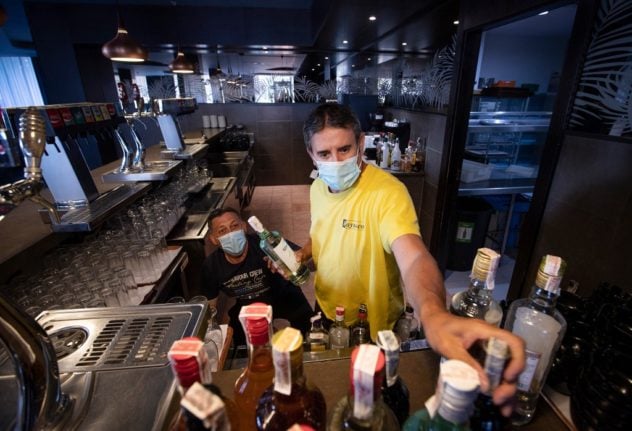A glass of (cheap) wine and some (free) tapas. This simple combination is a part of the atmosphere that attracts so many people and tourists to move to or at least spend a few days in Spain – and it might be about to end soon.
The European Union is looking to increase taxes on beer, wine, and other alcoholic beverages as the minimum rates to be applied by all member states have not been revised since 1992.
The rates “have not kept pace with inflation, the evolution of the market, consumption patterns or growing public health concerns”, the EU commission said.
Currently, Spain exercises one of the lowest duties in Europe, collecting just about € 2.69 per 700ml liquor bottle. Germany collects € 3.65, France € 5.05, and Italy € 2.90, as a comparison.
READ ALSO: What’s cheaper about life in Spain than in other countries?
When it comes to beer, the country taxes € 0.03 per 33cl, well below the European average of 14 cents, according to the EU Commission database.
It makes for some famously cheap alcoholic drinks – and the Spanish cities and islands’ bars and restaurants indeed thrive from the business such an offer can draw.
However, Spain could collect some € 1bn in taxes yearly if it applied similar rates as its neighbouring European countries, Diario de Navarra reports.
READ ALSO: 13 mistakes tourists in Spain are bound to make
Spain’s collection of excise duties accounted for only 0.29 per cent of its total tax revenues in 2019. However, the EU average is 0.79 per cent.
The country is also famous for its “happy hour” deals, with free tapas or two for one drinks sometimes lasting much longer than an hour, making it really the land of cheap alcoholic beverages.
Calls from the health sector
Besides increasing tax collection, Spanish authorities also have to weigh complaints and growing calls for higher taxes from health sector representatives – those looking to reduce consumption by ending the rule of the cheap alcohol in Spain.
For years, health associations in Spain have issued alerts on the connections between alcohol and health problems, with children and adolescents particularly vulnerable in Spain.
While tobacco use has decreased over the years, the “prevalence of drunkenness”, meaning the percentage of teenagers who say they “often” get drunk, is above the European average, at 17 per cent in Spain, according to a 2019 EU study.
To prevent alcohol abuse, several medical institutions and associations in Spain have been asking for a price increase in alcoholic beverages and even an increase in the minimum age for consumption in the country.
READ ALSO: Ten facts you probably didn’t know about Spanish wine
Spanish teenagers can legally start alcohol consumption at 14 years, and the Spanish Society of Family and Community Medicine (SEMFYC) is asking for the government to increase that age to 18.
SEMFYC also points out that an excise tax should be used to increase the price of alcoholic beverages and reduce their accessibility either through taxes or by setting a “minimum price”.
The organisation strongly defends that there is no proof that a “moderate consumption” of alcohol brings benefits, questioning the idea that the one glass of wine a day, a staple of some versions of the healthy Mediterranean diet, is actually good for people’s health.
Will my wine get more expensive, then?
In the short term, no, but the difference in tax collection compared to other EU countries is weighing on Spanish authorities – a yearly € 1bn in the collection is not something to be ignored.
Even if the government doesn’t make a move first, the European Union has launched a public call for feedback on its framework governing excise duty rates for alcohol. It will stay open until July 4th.
It favours higher taxes, if not to respond to galloping cost of living prices in the continent, as a way to adapt to growing public health concerns. EU processes can take long, and their adoption by member states still longer, but there may come a time when Spain will no longer be the land of cheap alcohol.
READ ALSO: Ten things NEVER to do when dining in Spain
Traditions can adapt and evolve, and as long as the tapas and lively environment remain more or less the same, happy hour can continue to be just as happy.



 Please whitelist us to continue reading.
Please whitelist us to continue reading.
I’m curious why the article doesn’t include the reduction in tourist traffic and money added to the economy when sharing the upside of a billion euros in additional taxes. This won’t come for free as the article shares many go on holiday to Spain for these reasons. As far as raising taxes to deter younger people from drinking? That hasn’t worked anywhere in the world and that is with alcohol pricing significantly higher than it is in Spain. I am not a fan of the EU directing cultural constraints on countries, the EU was a trading block for economic purposes and now its purely a 4th level of government only, and when has that EVER added value.
I agree & maybe it’s just me but instinctively I rile at the notion of a body of authoritarian figures dictating my every move. Most people are responsible enough to know what they should and shouldn’t do & regulating what people can and cannot eat or drink won’t deter those who don’t. Why fix it if it’s not broken & as the previous poster has stated people come to Spain not just for the sea and sun but for the cheaper prices. This model has served Spain very well & I hope they don’t lose sight of the fact that there are plenty of cheap alternatives to head for if prices become unattractively high.